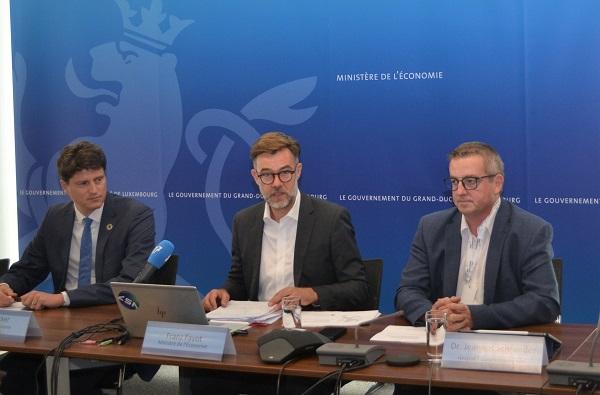 (L-R): Luc Decker, Ministry of Economy; Franz Fayot, Minister of Economy ; Dr. Jeannot Schroeder, MD +ImpaKT Luxembourg SARL;
Credit: MECO
(L-R): Luc Decker, Ministry of Economy; Franz Fayot, Minister of Economy ; Dr. Jeannot Schroeder, MD +ImpaKT Luxembourg SARL;
Credit: MECO
On Friday 12 August 2022, the Ministry of the Economy held a press conference at which Minister Franz Fayot presented the first operational measures to promote and develop the sharing economy in Luxembourg.
These measures are part of a roadmap detailing operational recommendations and several pilot projects resulting from a study by the Ministry of the Economy. The objective of this study was to review the different business models and public mechanisms applied in other countries, to identify the elements that hinder or promote the deployment of the sharing economy in Luxembourg, and to analyse the development paths of economic activities in this area.
In the context of this study, given that there is no single clear and precise definition, it was decided to define the sharing economy as an economic model that makes it possible to organise the sharing and provision of, in the short term, durable goods between actors, through a transaction that creates economic added value. This has a number of competitive advantages such as saving time, money and better use of resources.
To stimulate the development of the sharing economy, nine measures aimed at raising awareness, supervising, supporting and financing both project leaders, existing companies and existing and future users were identified. In addition, there are four pilot projects. During the press conference, Minister Fayot announced the implementation, in the short term, of the following recommendations:
• In order to stimulate existing companies' awareness of the opportunities that the sharing economy represents for their activities, a support module on the sharing economy is integrated into the Fit4Sustainability coaching and co-financing programme offered by Luxinnovation with the support of the Ministry of the Economy;
• In order to make project leaders aware of the sharing economy from the ideation of the entrepreneurial project, a training module will be integrated into the Fit 4 Start acceleration programme offered by Luxinnovation with the support of the Ministry of the Economy to support Luxembourg and international start-ups;
• In order to change the culture of possession of objects, a call for projects will be launched, aimed at municipalities or interested economic players, to create spaces for sharing equipment (for example, by creating a kiosk, kind of tool library) in existing or future districts. The objective of such a pilot project is to define a concept and a business model of the equipment sharing type and to validate the approach for the purposes of transposition on a larger scale.
Parties interested in participating in the call for projects to create spaces for sharing equipment in particular are invited to contact Ernest Boever (e-mail: ernest.boever@eco.etat.lu) at the Ministry of the Economy.
The pooling and sharing of products, targeted through the sharing economy, is a key concept in the implementation of a circular economy. Since 2014, on the initiative of the Ministry of the Economy, the government has been working to move from a linear economy to a circular economy, identified as one of the pillars of its socio-economic development policy. Widely acclaimed within the framework of the Rifkin study, the circular economy is the subject of a national strategy which was launched in February 2021 and offers practical guidelines to citizens, businesses, municipalities and administrations in the region.
Minister Fayot said: “The sharing economy creates new opportunities for many players and serves as a catalyst for innovation. By promoting the optimisation of resources, the 'sharing economy' contributes to achieving the objectives of sustainable development of society and the economy".
Dr. Jeannot Schroeder, managing director at +ImpaKT Luxembourg SARL, who helped carry out the study, commented: “The sharing economy can have a very significant impact because, for example, a shared drill has the potential to replace dozens of private machines, which are only used for a few minutes a year.”








